


GitHub Copilot transformed software development with AI pair programming since its launch in 2021. But today, developers have a growing menu of GitHub Copilot alternatives ranging from AI editors and plugins to AI enterprise dev platforms like Superblocks.
In this article, we'll cover:
- Why developers are looking for Copilot alternatives in 2025
- The best free and paid tools to replace or extend Copilot
- What each tool is best for
Why developers look for Copilot alternatives
Developers seek Copilot alternatives because of concerns about cost, IDE compatibility, governance, and model flexibility.
GitHub Copilot (powered by OpenAI’s models) integrates into popular editors to suggest code and even help with explanations. It accelerates development by autocompleting lines or generating functions in context.
However, developers cite many pain points in reviews and forums that drive them to alternatives:
- Cost and licensing: Copilot is a paid subscription. It costs $10/month for individuals, $19/month per user for businesses. Some developers seek low-cost alternatives.
- Broader IDE and language support: Other tools may offer better integration with particular IDEs like JetBrains, Vim, or Emacs.
- Governance & security gaps: Copilot now offers a business tier with some policy controls, but it’s still a cloud service. Some tools can be hosted locally.
- Model flexibility: Copilot uses OpenAI’s model. You can’t choose or fine-tune the model. Some developers want the ability to choose different AI models or use larger context windows.
The top 9 GitHub Copilot alternatives in 2025
Before we discuss each detail in depth, let's look at how the tools compare side by side:
1. Superblocks
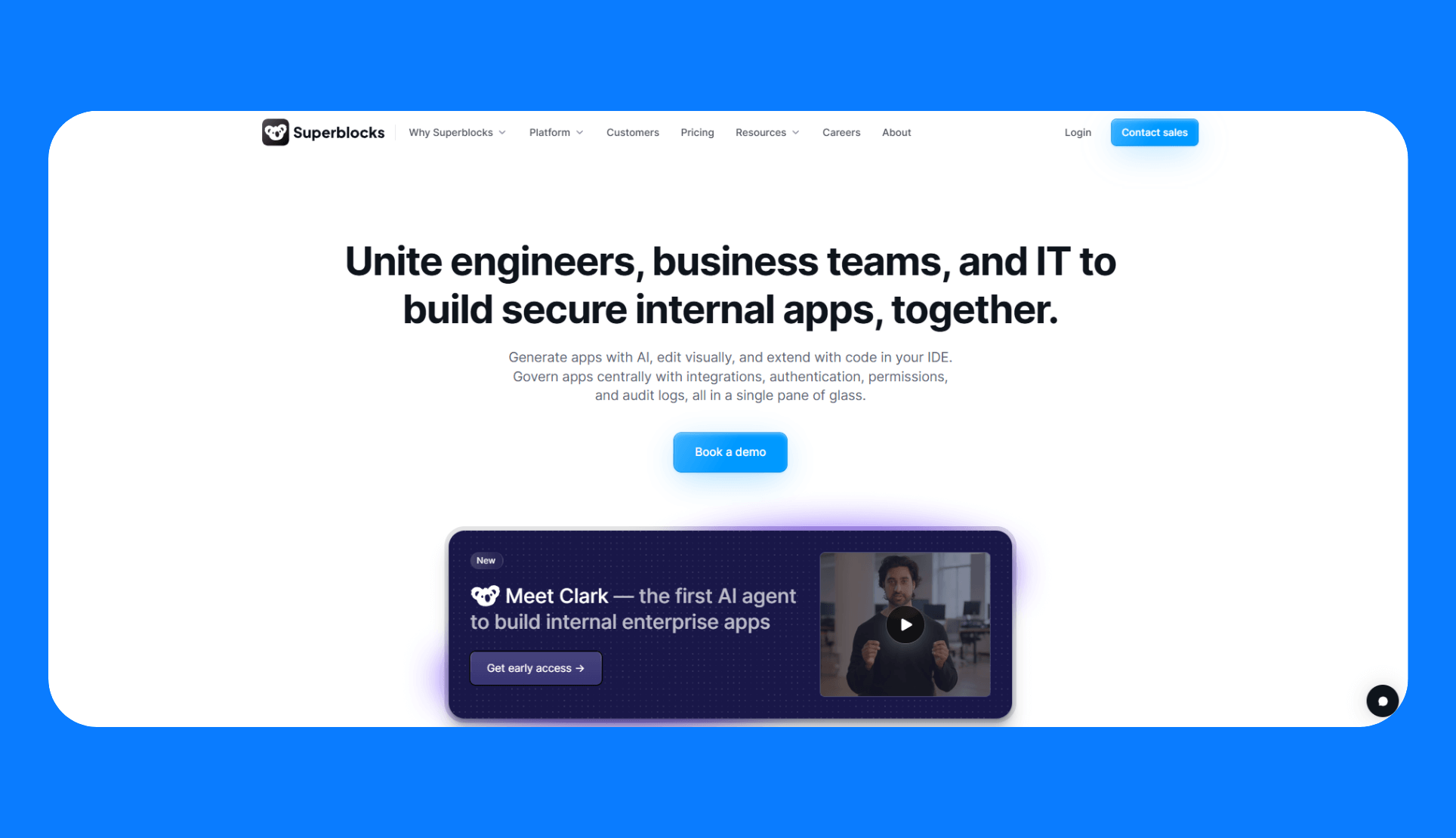
Superblocks is an AI internal app development platform that helps enterprises solve shadow IT and engineering bottlenecks with a secure, centrally governed platform.
Teams can use Clark, Superblock’s AI agent, to scaffold internal software, then refine with a drag-and-drop editor or in code with their preferred IDE. These multiple levels of abstraction unite engineers, IT, and business teams on one secure platform.
Key advantages
- Three development modalities: Anyone in your organization can build internal apps with prompt-to-app AI generation, a WYSIWYG editor, and code. You build with the level of abstraction you prefer. The two-way sync between the editor and your IDE means you can switch between coding and drag-and-drop without losing context.
- AI app generation with guardrails: You can customize prompts, sanitize inputs, and define systems and permissions that Clark must follow.
- Centrally managed governance layer: Superblocks supports granular RBAC, SSO, and audit logs. You can also manage your secrets by integrating with secret managers like HashiCorp Vault. A centralized control layer gives teams visibility across users and applications.
- Deep integration with APIs, data, and SDLC: You can connect Superblocks to any API (REST, gRPC, GraphQL API, and OpenAPI) or database. It integrates with your SDLC processes, including Git-based workflows, CI/CD pipelines, and approval processes.
- Field engineering & forward-deployed help: Forward-deployed engineers work on-site or virtually to help teams stand up their first applications, integrate with existing systems, and follow best practices. This kind of support accelerates time-to-value.
Ideal users: Organizations and dev teams that want to democratize development using AI but responsibly, with centralized security and governance features.
Pricing
Superblocks offers custom quotes based on the number of builders, end users, and deployment needs.
Bottom line
Superblocks is the alternative to choose when governed, production-ready workflows are your priority. It’s more than a Copilot replacement. It’s an AI generation platform tailored for building secure internal applications with centralized oversight.
2. Cursor
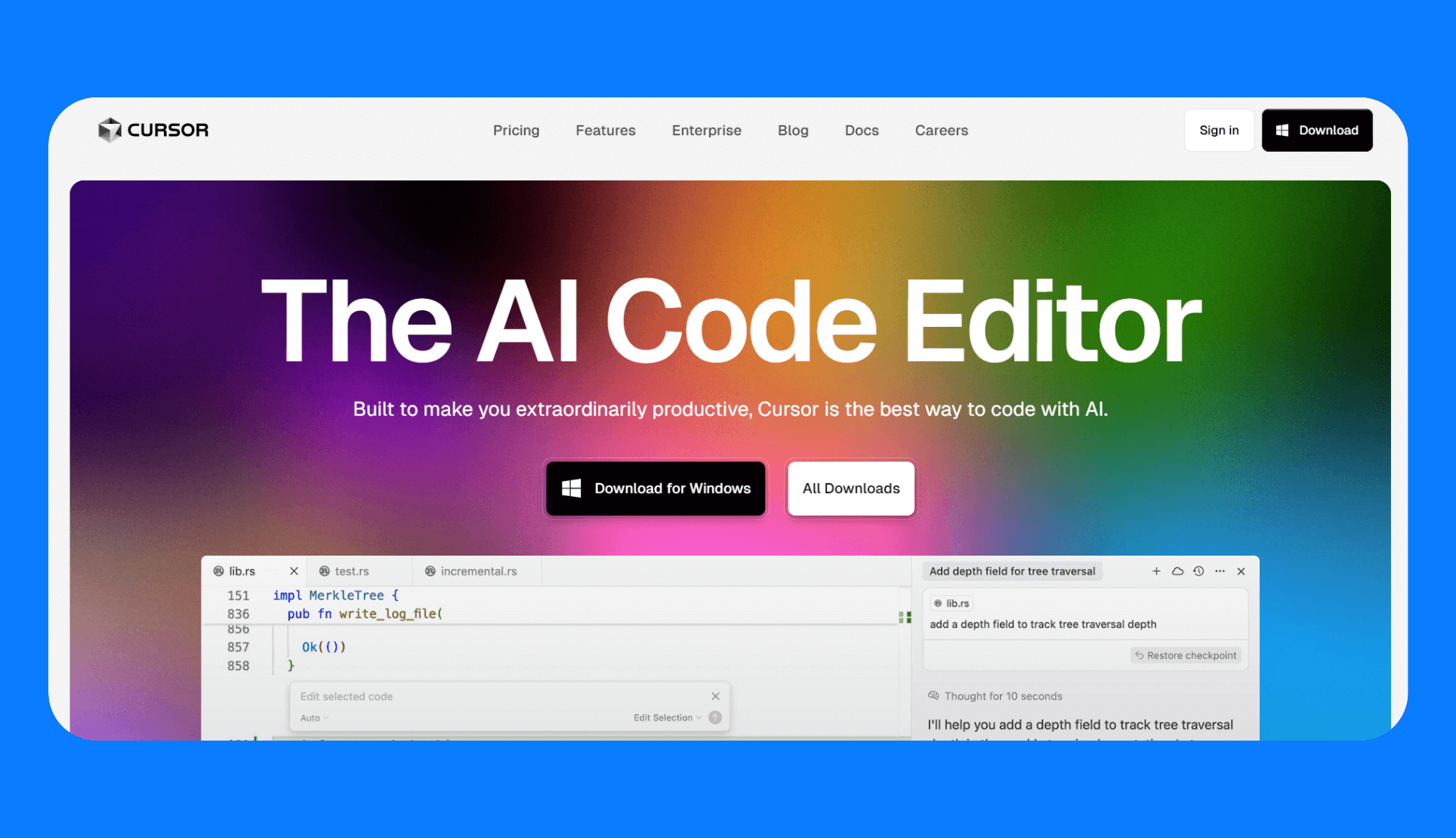
Cursor is an AI-powered IDE for Windows, macOS, and Linux. It started as a fork of Visual Studio Code but layers on AI features like natural-language editing, multi-line suggestions, and project-wide context awareness.
Key advantages
- AI-native IDE: The Cursor Tab feature predicts your next lines or entire code block as you code and lets you accept with tab.
- Natural language editing: You can highlight a section of code and tell Cursor in plain English what to do. For example, refactor this function to use async/await. Cursor will apply the edit directly in your code and show the diff for review.
- Codebase aware: Cursor builds an index of your repository. You can ask questions about your own code, and Cursor will respond with context-aware suggestions.
- Privacy mode: Privacy Mode ensures models don’t store your code or use it for training.
Ideal users: Software engineers who enjoy conversational coding and heavy autocomplete assistance.
Pricing
Cursor has a free tier that supports a limited number of AI completions and chat queries per day for $0. The Pro plan is $20/month for individuals, which gives unlimited completions and higher usage limits for the chat/agent features. Teams can opt for Team plans at $40/user/month with central billing and policy controls.
Bottom line
Cursor offers more responsive and context-aware assistance than Copilot inside VS Code, thanks to features like natural language edits and deep codebase knowledge.
3. Windsurf

Windsurf is an AI-powered IDE and coding assistant that evolved from Codeium, a well-known free Copilot alternative. Windsurf comes as a standalone Windsurf Editor built on VS Code’s interface and plugins for existing IDEs.
Key advantages
- Free unlimited autocomplete: Windsurf’s biggest draw is that core features are free for personal use. You get unlimited tab completions in your IDE without a subscription.
- Cascade flow: The Cascade agent handles multi-step tasks. It can remember context, patterns do lint fixes automatically for any code it generates, and even run terminal commands or tests as instructed.
- Multi-IDE and collaboration: It’s not limited to its own editor. It has plugins for JetBrains, VS Code, Vim, and Jupyter.
Ideal users: Windsurf is ideal for developers who want a versatile Copilot alternative that can work in multiple development environments.
Pricing
The free plan is $0 for 25 prompt credits/month, unlimited tab completions, and 1 app deploy per day. Paid plans start at $15/user/month for 500 prompt credits/month and 5 app deploys per day.
Bottom line
Windsurf delivers Copilot-like capabilities for cheaper. You get code tab completions across many languages and IDEs, plus data opt-out options for free.
4. AWS Q Developer
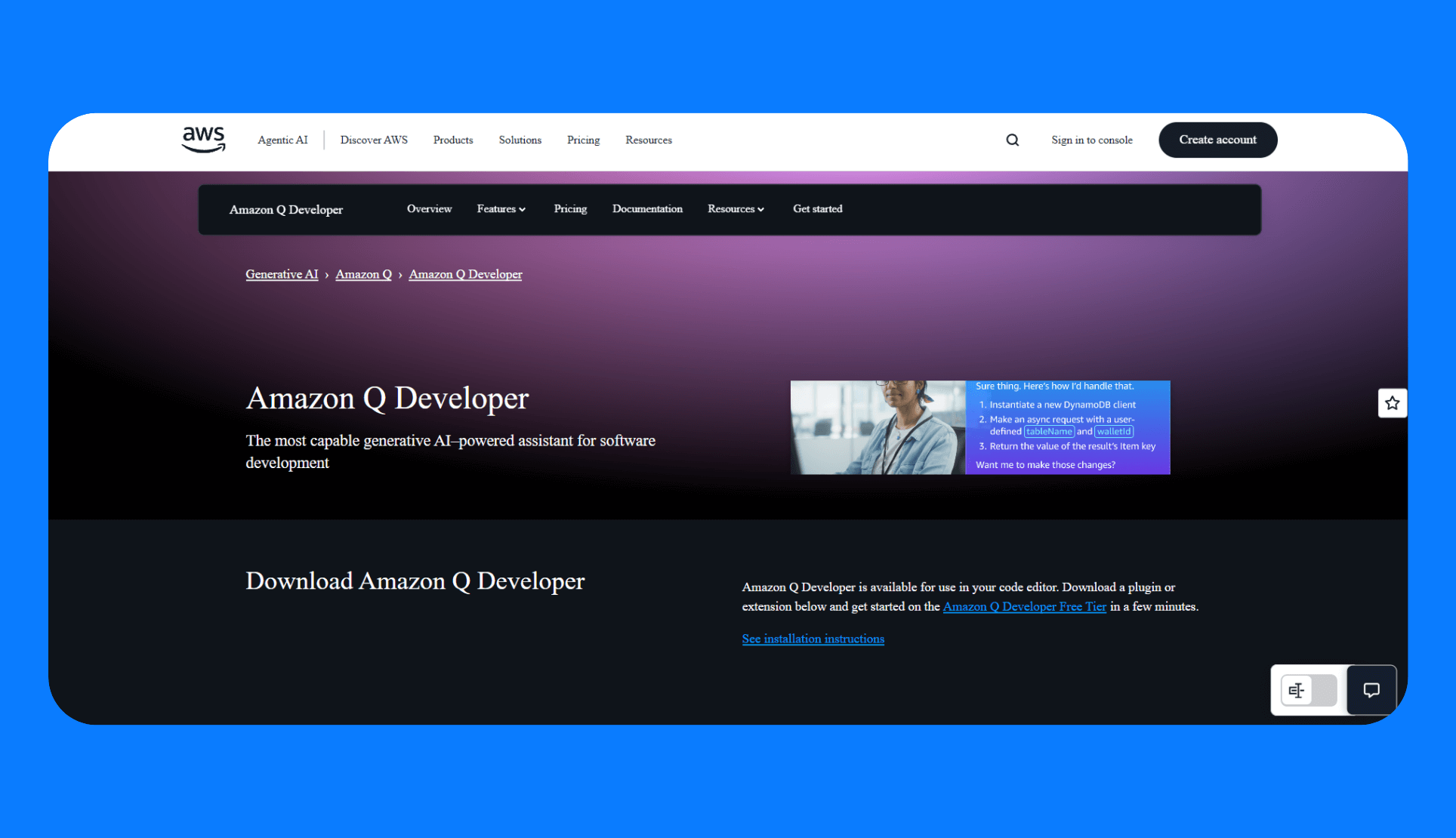
Amazon Q Developer is part of the broader Amazon Q family of generative AI assistants (which also includes ones for cloud operations, analytics, etc.). Q Developer works as an extension in your IDE and as a chat assistant in the AWS Console or AWS CLI.
Key advantages
- Deep AWS expertise: Q Developer understands your architecture, services, and SDKs, and follows AWS best practices when generating code.
- Agentic coding with Q agents: It can perform multi-step tasks autonomously. Ask it to scan a codebase for vulnerabilities, refactor legacy code, or upgrade a Java version, and it will read the files, make necessary changes, run tests, and return a diff.
- Security, testing, and reliability: Q Developer can scan for vulnerabilities and suggest safe fixes. It can generate unit tests and documentation. It also offers IP indemnity for enterprise users.
Ideal users: Teams building on AWS. If you're writing Lambda functions, configuring infrastructure, or debugging services in production, it offers context-aware suggestions and automations.
Pricing
Q Developer has a free tier that supports 50 chat interactions and 1000 lines of code transformations. Paid plans start at $19/user/month for up to 4000 lines of code transformation per month.
Bottom line
If your team builds on AWS, Q Developer provides context-aware assistance that understands both your code and your cloud architecture.
5. Claude Code
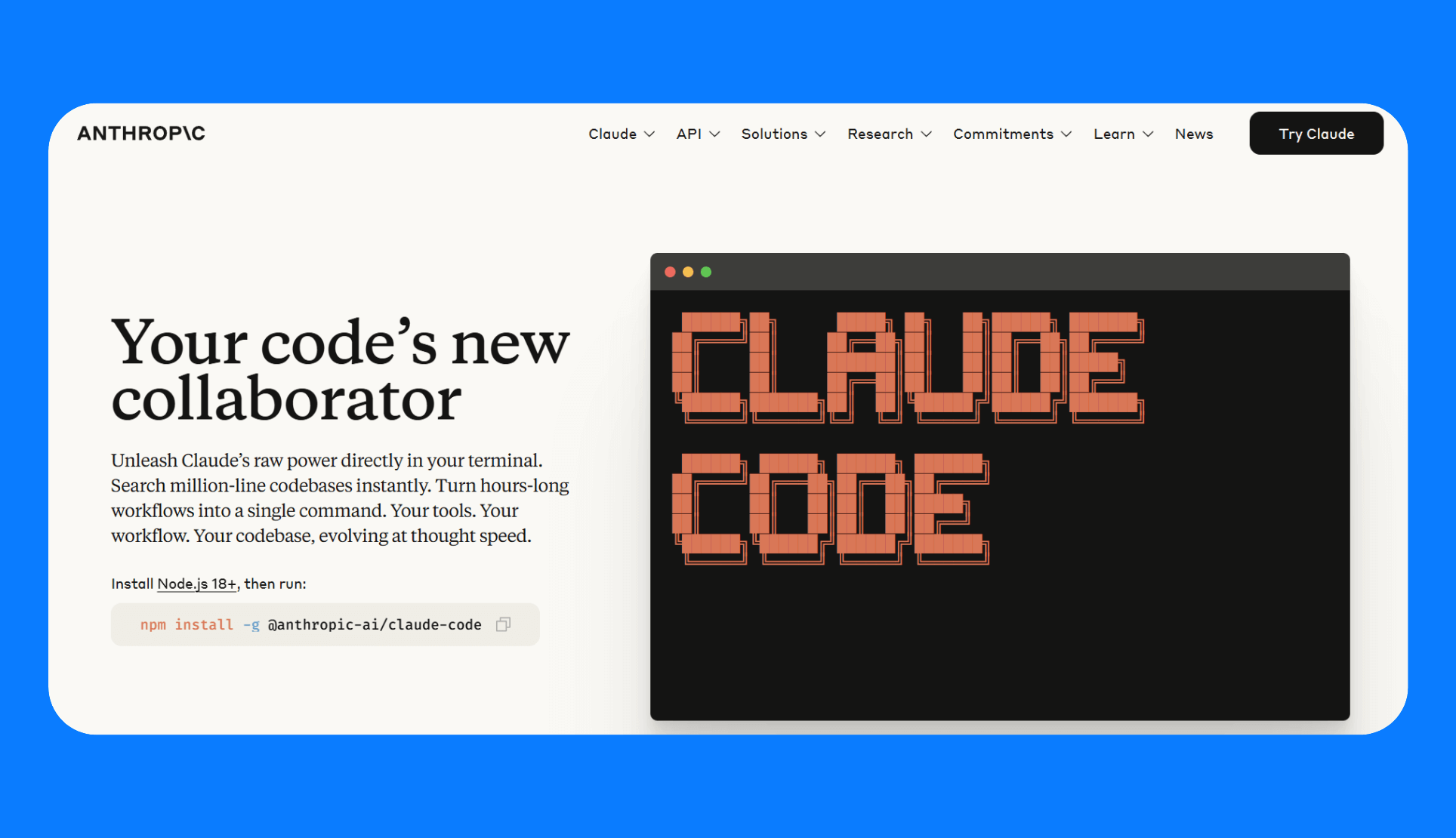
Claude Code is Anthropic’s official agentic coding assistant, released in early 2025 alongside the Claude 3.7 Sonnet and later Opus 4 models. It runs in your terminal and integrates with IDEs like VS Code and JetBrains. It understands your entire codebase, can run tests, edit files, commit changes, and more via natural-language prompts.
Key advantages
- Deep codebase intelligence: Claude Code builds an internal map of your whole project automatically. You can ask it to explain, debug, or refactor code, and it responds with context-aware edits across multiple files.
- Agentic workflow capabilities: Claude Code handles multi-step workflows. It can run build/test commands, resolve lint issues, generate PRs, and apply changes from the terminal. It surfaces results as diffs and asks for approval before committing.
- Tooling Integration: Claude Code integrates with existing tools such as GitHub, GitLab, and CI/CD pipelines. It also supports Model Context Protocol (MCP) to fetch context from sources like Figma or Jira.
Ideal users: Engineers who prefer command-line workflows and want granular AI interaction with their repos.
Pricing
Claude Code individual plan costs $17/month billed annually or $20/month billed monthly. Max ($100 for Max 5x and $200/month for Max 20x) plans unlock higher usage limits and access to Claude Opus 4.
Bottom line
Claude Code blends full codebase awareness, reasoning abilities, and CLI tooling into one workflow. It’s for developers who want an AI partner actively performing tasks in their environment.
6. OpenAI Codex
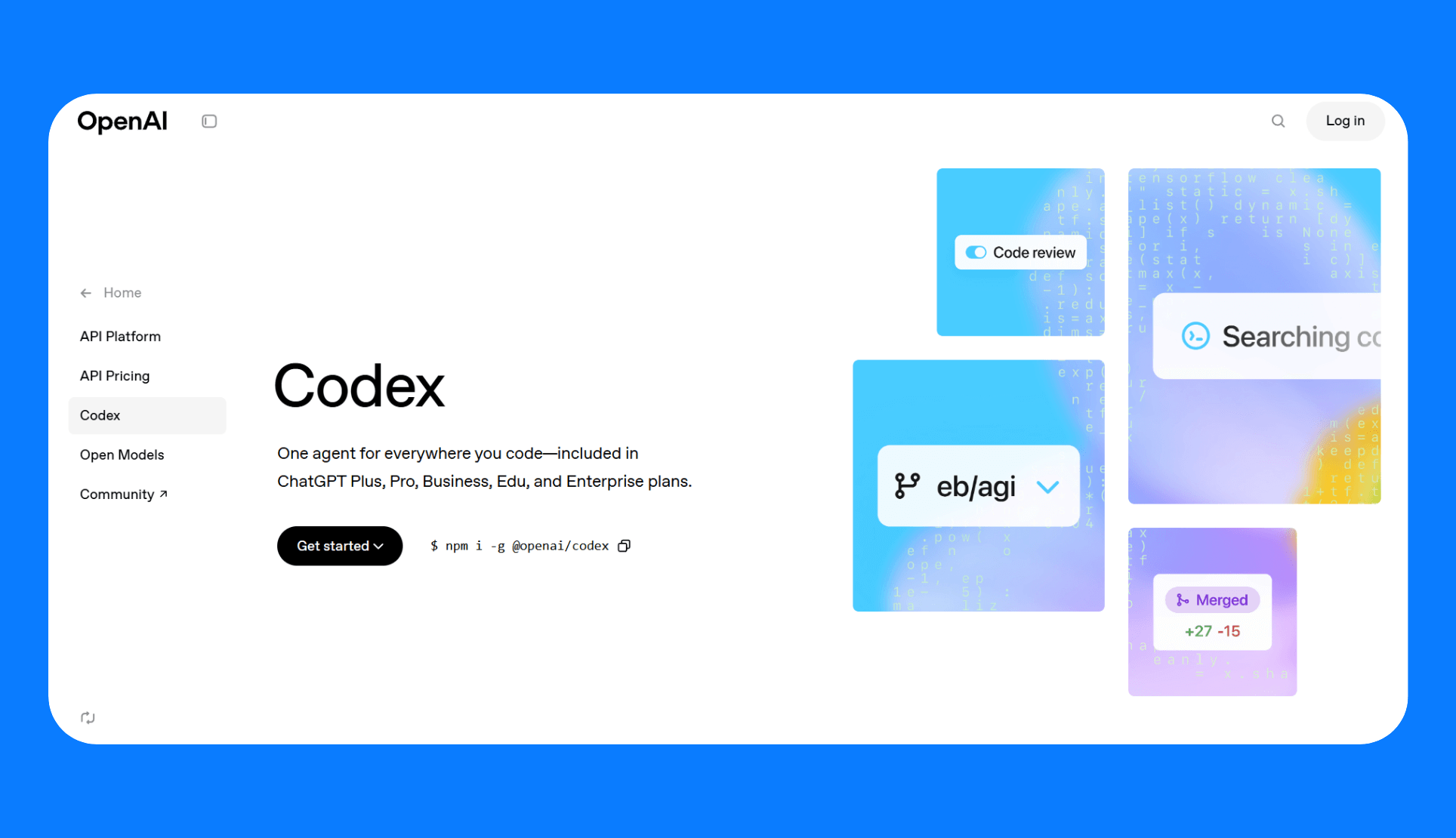
OpenAI Codex is a fully agentic coding assistant built into ChatGPT. It uses a model called codex‑1, based on OpenAI’s o3 series, to autonomously perform coding tasks. Unlike Copilot, Codex can run commands, test code, fix bugs, and propose pull requests within ChatGPT’s interface, with each task running in its own sandbox preloaded with your repo.
Key advantages
- Agentic task support: Codex can operate on multiple tasks in parallel while you focus on other work.
- Safe, isolated execution: Each task runs in a sandboxed cloud environment. It preloads your repository, runs linting, type checks, and test suites.
- Dev & codebase integration: Codex integrates natively with GitHub repos, and supports workflows like pull request automation, code review summaries, and change diffs. It also includes a Codex CLI tool for local terminal agents.
Ideal users: Development teams who want to delegate well-scoped tasks like refactoring, renaming, writing tests, and bug fixes to an autonomous agent.
Pricing
Codex is available to ChatGPT Plus, Pro, Team, and Enterprise users at no extra cost. Paid plans start at $20/month for Plus. Codex CLI is open-source and free. You only pay for API usage when using the CLI or API directly.
Bottom line
Codex behaves like a cloud-native software engineering agent that plans, writes, tests, and reviews code in isolated environments. It’s best suited for teams who need automated PRs, codebase Q&A, and multi-task agents.
7. JetBrains AI
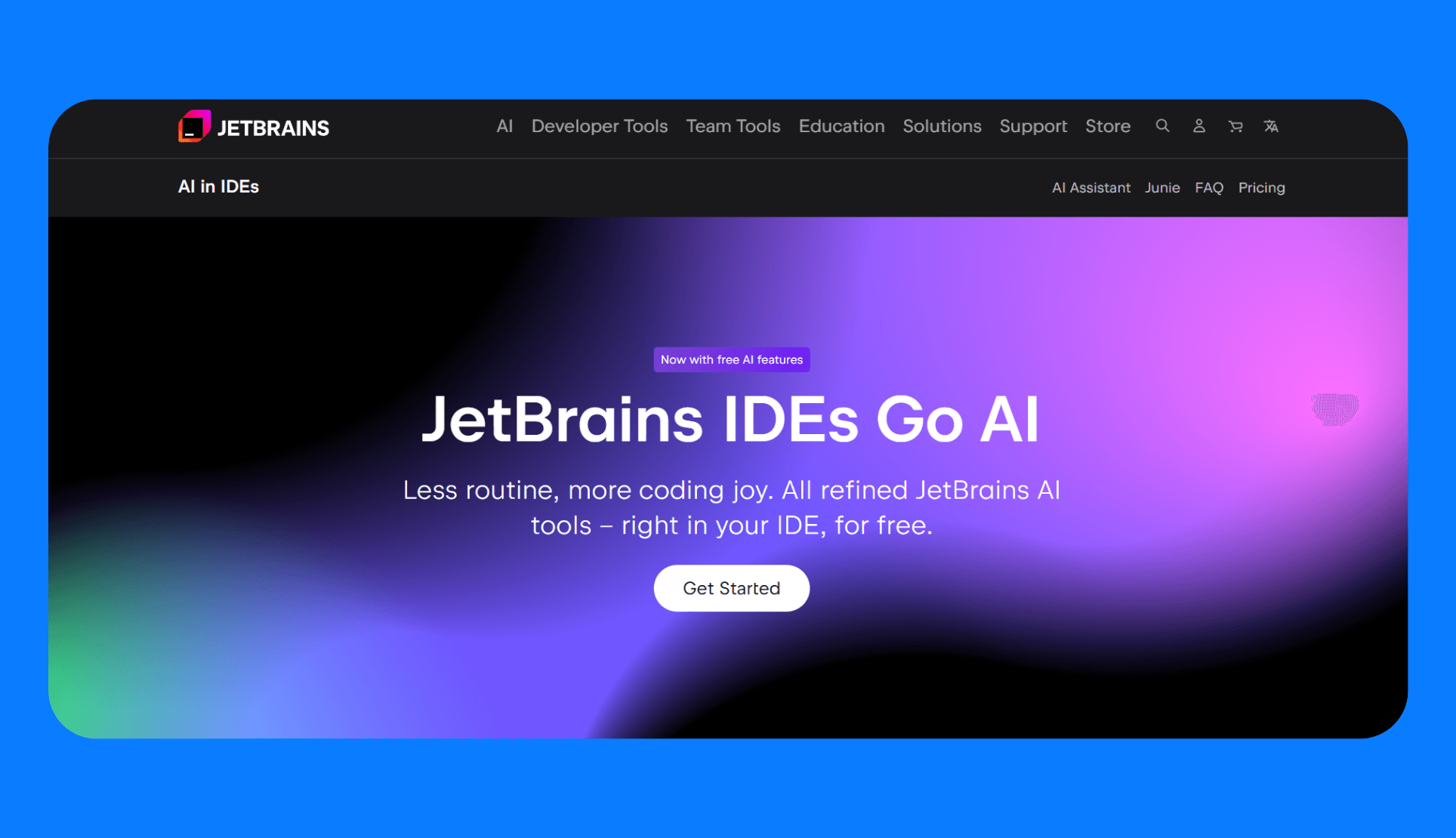
JetBrains AI is a native extension of JetBrains development tools that embeds AI capabilities directly into the IDEs. It supports code completions and has a coding agent named Junie that plans, writes, refines, and tests code autonomously.
Key features
- AI capabilities: It provides unlimited code completions at line, function, and block levels
- IDE integration: It works in most JetBrains IDEs, including IntelliJ IDEA, PyCharm, WebStorm, GoLand, PhpStorm, RubyMine, and RustRover.
- Model flexibility: Lets you pick among leading LLMs or use local models for privacy and offline workflows.
- Team tool integrations: Extends to team tools like YouTrack (for project management), Grazie (writing companion), Datalore (data science), and TeamCity (CI/CD).
Ideal users: Developers already using JetBrains IDEs who want AI acceleration without switching editors.
Pricing
The free tier covers unlimited code completion, local AI support, and 3 AI credits. Individual plans start at $10/month and add 10 AI credits plus limited Junie agent access. Organization plans begin at $20/user/month with 20 AI credits and limited Junie usage.
Verdict
JetBrains AI works best for developers already invested in the JetBrains ecosystem. The integration feels natural, but you're limited to JetBrains IDEs.
8. Zed
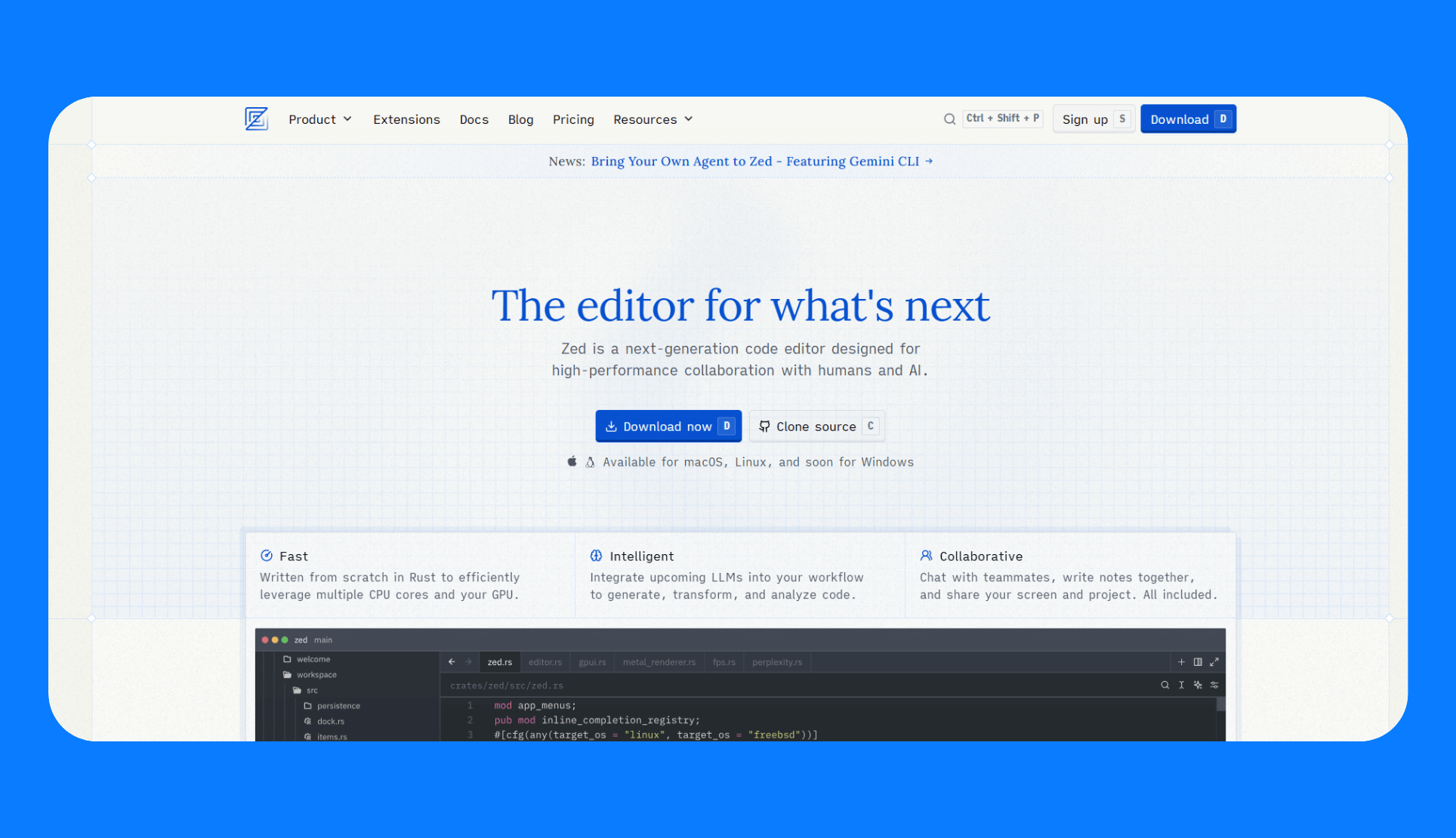
Zed is an open-source code editor developed in Rust. It prioritizes speed, efficient resource usage, and real-time code collaboration. Plus, it works on Linux and Mac, with Windows support currently in beta.
Key strengths
- AI integration: Zed offers AI-assisted coding through its open-source Zeta model or via external providers (OpenAI, Anthropic, Copilot, etc.). You can use inline completions, edit predictions, and an agent panel to manage natural‑language instructions.
- Collaboration: Zed has integrated real-time multiplayer editing, including chat, shared sessions, multibuffer editing, and voice or screen-sharing features. Teams can write code together live,
- Open source and extensibility: The source code is public, enabling community audits and contributions. Users can customize the editor via themes and plugins.
Ideal users: Developers and teams who value built‑in collaboration and open‑source transparency.
Pricing
The personal plan is free forever and gives you access to full editor functionality, 50 self-hosted prompts/month, and unlimited prompts if you’re using your own API key. The paid plans start at $20/month for 500 prompts per month, with overage pricing beyond that.
Bottom line
Zed is a strong option for developers who want fast editing, multiplayer coding, and flexible AI setup without relying on proprietary platforms.
9. Replit
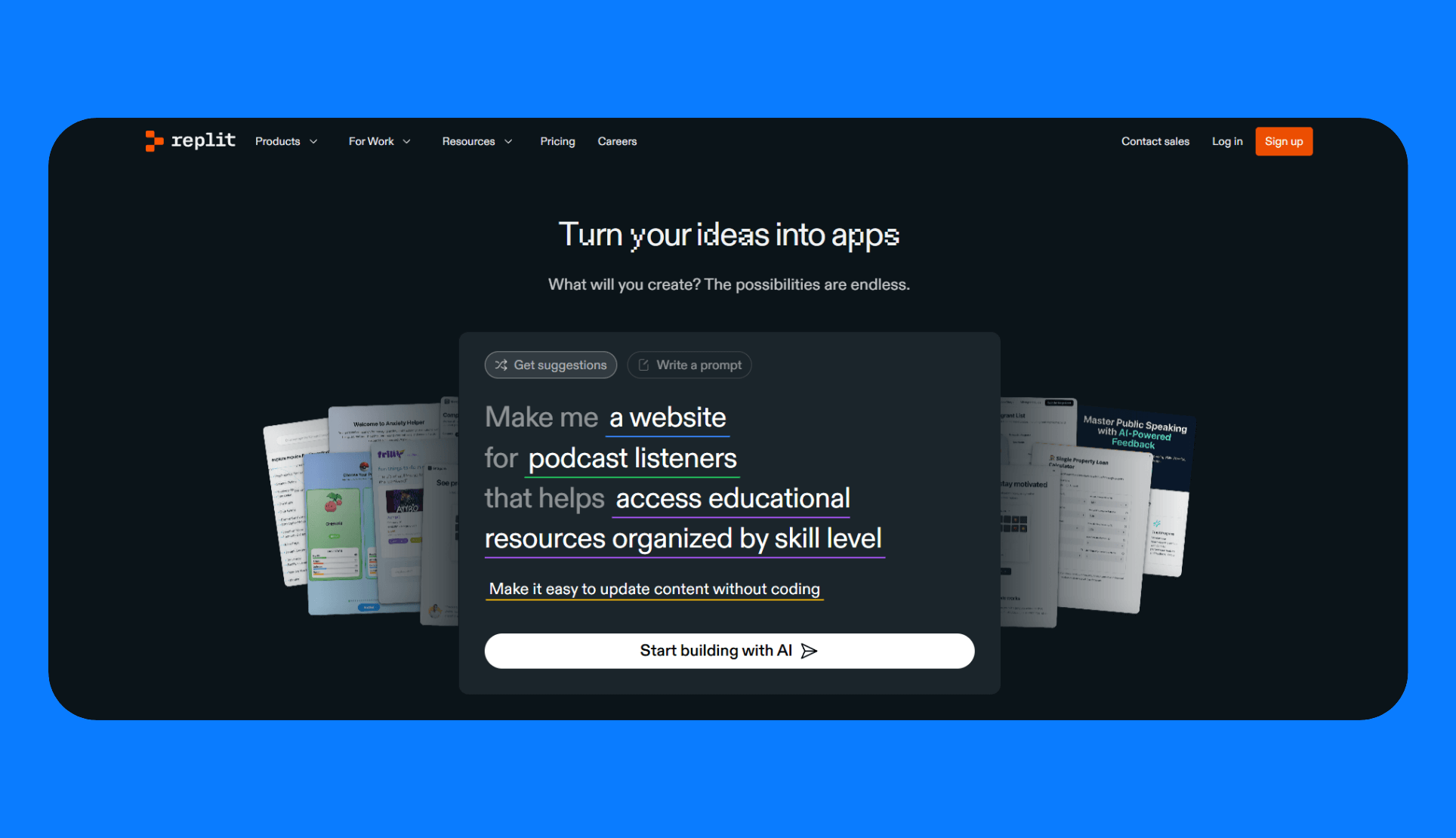
Replit's AI coding is a browser-based IDE. It has an AI assistant and agent.
Replit’s Assistant provides inline code suggestions, debugging, and conversational edits within the IDE. Agent automates features like full-function generation, multi-file builds, deployment, and testing from plain English prompts.
Key advantages
- Browser-native AI IDE: Assistant is built into Replit’s online coding environment. You get context-aware completions, code explanations, transformations, and chat-driven editing, all without installing any local tooling.
- Full agentic app generation: Replit Agent handles multi-file tasks such as building UI, setting up backend, integrating dependencies, deploying live previews, and even debugging.
- Real-time collaboration and instant deployment: Replit supports multiplayer coding, shared workspaces, built-in Git integration, and one-click deployments
Ideal users: Designers, educators, and indie hackers who want AI-driven editing, testing, and deployment from a shared remote workspace.
Pricing
Replit Assistant is available on the free tier ($0/month), which includes autocomplete and code explanations in public apps. Access to the AI agent requires the Core plan, billed at $20/month. The Core plan also unlocks private repls and live deployments,
How we chose these GitHub Copilot alternatives
We evaluated these alternatives based on real-world developer needs. We looked at:
- Code completion quality and contextual awareness
- IDE integration and developer workflow compatibility
- Pricing and accessibility for different team sizes
- Enterprise features like governance, security, and compliance
Secondary considerations:
- Model flexibility and customization options
- Community support and development velocity
- Specialized features for specific use cases
- Data privacy and security controls
Final verdict
The best Copilot alternative depends on your specific needs. Different developers have varying needs, and some alternatives might offer features that are better suited to specific workflows, languages, or development environments.
To put it broadly:
- For enterprise teams building internal tools: Superblocks combines AI coding with governance and app development capabilities, making it ideal for platform teams who need to democratize development while maintaining control.
- For assistants in the IDE: Cursor offers the most advanced AI-native IDE experience with deep codebase understanding.
- For terminal users: Claude Code provides powerful AI assistance directly in your command-line workflow.
- For budget-conscious developers: Zed (open source) is affordable.
- For AWS-focused teams: Q Developer offers native cloud integration and optimization guidance.
- For autonomous task delegation: OpenAI Codex excels at handling entire development tasks end-to-end in parallel cloud environments.
Build responsibly with AI using Superblocks
Superblocks helps operationally complex enterprises solve the complexity, risk, and overhead of building and maintaining internal applications. It provides a centrally governed and secure platform that gives IT visibility across all apps and users in the organization.
The following set of features enables this:
- Flexible development modalities: You can use Clark to generate apps from prompts, the WYSIWYG drag-and-drop editor, or code. It has 2-way live sync between code and the visual editor. Anyone in your org can build internal apps securely with their preferred level of abstraction.
- Context-aware AI app generation: Clark enforces your organizational standards for data security, permissions, and compliance. This addresses the major LLM risks of ungoverned shadow AI app generation.
- Centrally managed governance layer: It supports granular access controls with RBAC, SSO, and audit logs, all centrally governed from a single pane of glass across all users. It also integrates with secret managers for safe credentials management.
- Keep data on prem: It has an on-prem agent you can deploy within your VPC to keep sensitive data in-network.
- Extensive integrations: Superblocks connects to any API or database. You can also integrate with your SDLC processes, like Git workflows and CI/CD pipelines.
- AI app generation guardrails: You can customize prompts, sanitize them, and set LLMs to follow your design systems and best practices. This helps you manage AI risk that comes from democratizing development with AI app-gen.
Ready to build securely with AI? Book a demo with one of our product experts.
Frequently asked questions
What is the best free GitHub Copilot alternative?
The best free Copilot alternative is Zed, an open-source AI model that works with your AI models. It runs locally, supports full customization, and doesn’t require a subscription to get started.
Which is the best Copilot alternative for teams?
The top Copilot alternative for teams is Superblocks, built for enterprise-grade internal app development. It combines AI assistance with centralized governance, permissioning, and secure deployment workflows.
What's the cheapest option with good features?
Zed offers the best value since it has a free option if you bring your own API keys.
Which works outside of VS Code?
Most of the tools in this list work outside VS Code, including Superblocks, AWS Q, Windsurf, and Claude Code. Zed and Windsurf support JetBrains IDEs, while Claude Code runs in the terminal.
Can I use a self-hosted Copilot alternative?
Yes, Zed supports self-hosting with local models and custom integrations. It’s fully open-source, giving you full control over data, model choice, and deployment.
Which tool is best for secure internal apps?
Superblocks is the best option for secure internal apps. It offers features such as RBAC, SSO, audit logs, and on-prem agent support. These features help enterprises meet compliance and governance needs while accelerating AI-driven development.
Stay tuned for updates
Get the latest Superblocks news and internal tooling market insights.
You've successfully signed up
Request early access
Step 1 of 2
Request early access
Step 2 of 2
You’ve been added to the waitlist!
Book a demo to skip the waitlist
Thank you for your interest!
A member of our team will be in touch soon to schedule a demo.
Table of Contents



.png)
%20(1).png)
.png)
